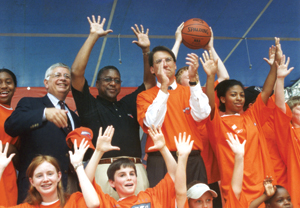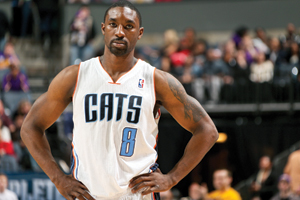The Charlotte Bobcats this month will be increasing their talks and consideration of whether to change their name and bring the Hornets brand back to the city.
It’s arguably the franchise’s biggest business decision in Michael Jordan’s three years of ownership.
Over the next few weeks, Bobcats executives will start poring over data recently collected by Harris Interactive to help guide the team in making the decision. It’s a move made possible by the New Orleans Hornets’ plan to become the New Orleans Pelicans starting next season, and it in part aims to recapture the NBA buzz that existed in Charlotte between the Hornets’ expansion debut in 1988 and when the club left for Louisiana in 2002.
 |
The Charlotte Bobcats are studying whether returning the Hornets name to Charlotte would generate much buzz. Ben Gordon is shown playing for the current team, and Dell Curry for the Hornets in 1992.
NBAE / GETTY IMAGES (2) |
The decision carries with it an estimated minimum $3 million rebranding price tag, but there’s more at stake than that. The team is looking to the research to determine whether a name change would benefit the struggling franchise enough to risk asking its fans to once again embrace a major move for the club. It’s a fan base that already has seen a lot of changes (and not many wins) across nine seasons, including an ownership change, executive leadership changes, uniform and team color changes, and a TV broadcast change.
Top team executives are taking a deliberate approach to the process.
“Since Michael Jordan became the owner, we have made some critical decisions, and this is a key decision that will have an impact on the long-term future and success of the franchise,” said Bobcats President Fred Whitfield.
Team officials declined to put a timeline on the decision, but the earliest any name change would occur would be for the 2014-15 season. And while team officials declined to discuss the methodology used to collect the data they’ll be reviewing, what they’re sifting through are surveys taken among season-ticket holders, sponsors and the general public.
Season-ticket holders were asked via an electronic survey a series of questions gauging their affinity for the Bobcats name and for the Hornets name. Other questions aimed to measure how season-ticket holders have invested in the Bobcats franchise since the NBA returned to Charlotte in 2004 and whether they were previously Hornets season-ticket holders.
The survey asked customers about team color preferences and logo affinity, as well.
“We will rely heavily on the data in making any decision relative to a name change,” said Pete Guelli, executive vice president and chief sales and marketing officer for the Bobcats.
In fact, the Bobcats and Harris used a similar approach not long ago, when they surveyed the market just after Jordan bought the franchise in 2010 from Bob Johnson. That process ultimately led to the decision to change the team’s color palette to include Carolina blue and diminish its previous dominant orange color.
“You have to go behind the mirrored glass and find out if fans have the urge to change the Bobcats name back to the Hornets or something else,” said Tom O’Grady, founder and chief executive officer of the Chicago-based branding firm Gameplan Creative, which designed the original Bobcats logo. “You have to find out what is the driving reason for a name change. Are people going to come back because they are now going to be the Hornets? It is a very interesting case study, and you have to get into the psyche of the fans to see if there is a burning desire to bring it back. The question isn’t whether they can get their name back. It is, ‘Do they really want it?’”
Bobcats executives must balance any remaining fan connection to the Hornets name of the past against the changing demographics in the Charlotte market. The metro area, with a population of less than 2 million, has seen its population increase by 600,000 since the Hornets relocated to New Orleans, team officials said.
Team officials are well aware that a new generation of fans has grown up in the market knowing only the Bobcats’ history.
“You see name changes in sports, but this is an unusual one,” O’Grady said. “The question begs, Is there residual love for the Hornets’ name?”
There is also no test case for the Bobcats to study as they explore this kind of change. No market has seen its original sports franchise leave for another city under the same team name and then later have the opportunity, as the Bobcats do, to rebrand under that original nickname, industry experts said.
“In a lot of the branding that we do, we constantly look back at the original brand name,” said Bill Frederick, principal at Fanbrandz, a branding company that lists the NBA as a client. “This is an unusual case. The risk is that in sports, fans feel they are owners of the brand, and there is always a portion of the fan base that feels betrayed.”
 |
Enthusiasm over the team’s arrival has been stymied by lackluster seasons.
MELANIE JORDAN NEEDHAM |
While a Bobcats name change to Hornets will cost a minimum of $3 million, it will be easier than the team adopting a new name because the league already owns the Hornets’ marks, eliminating most of the legal costs associated with trademarking a new name. The team would, however, have to pay for a complete “repainting” of the franchise, ranging from new letterhead to a new floor at Time Warner Cable Arena. In addition, the $3 million would include the cost of a new marketing campaign and other legal costs associated with a name change, as well as the cost of freshening the old logo.
But cost isn’t the driving issue. Experts said teams recoup the rebranding expenses of a name change, in large part through the new merchandise opportunities the change creates.
In New Orleans, the cost of the current Hornets’ change to Pelicans is still being calculated. The team opted to make the change just nine months after Tom Benson bought the franchise, in April 2012.
“It typically takes two years, but Mr. Benson was in a hurry to get it done and it was a promise as part of the sale,” said Ben Hales, Hornets senior vice president of marketing and business development.
Hales would not disclose how much the team expects to spend on the process. “You have to switch out every little thing, but cost is not a determining factor,” he said. “Whatever it is, it is going to be worth it. The name has to reflect local fan values.”






